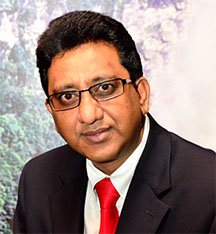Attorney Anil Nandlall, who represented opposition leader Bharrat Jagdeo in the no-confidence motion cases before the Court of Appeal, has asked acting Chancellor Yonette Cummings-Edwards to ensure that the final decisions accurately reflect his opposition to the suggestion that the constitution implied that an “absolute majority” was needed for the success of the vote.
“On a number of occasions during the course of the rulings in the Appeals at caption it was stated that all the Counsel who appeared agreed that Article 106(6) of the
Constitution captured the absolute majority formula by the language used in the Article.
I wish to respectfully remind Your Honour that I did not express any agreement with such a view,” Nandlall wrote in a letter to the acting Chancellor, dated March 25th.
“Indeed, I do recall during the hearings the Honourable Court inviting me to do so but I respectfully declined that invitation by intimating that the term “absolute” was not used as a prefix to the word “majority” by the framers of that Article (neither does it appear anywhere else in the Constitution),” he added.
Article 106 (6) of the Constitution states, “The Cabinet including the President shall resign if the Government is defeated by the vote of a majority of all the elected members of the National Assembly on a vote of confidence.”
While the motion was declared passed by a vote of 33 to 32 members in its favour, government based its legal challenge on the contention that “an absolute majority” of at least 34 of the 65-member National Assembly was needed.
In his letter, which was also copied to Justice of Appeal Rishi Persaud and Justice of Appeal Dawn Gregory, who also presided over the appeals, Nandlall further said he emphasised that the decision by the framers of the amendment not to use the term must have been deliberate. “I further recall respectfully submitting that the framers of that amendment could not have been unacquainted and unfamiliar with the term “absolute majority”, a well known term of art but yet they chose not to use it and that fortified my belief that its omission was deliberate,” he added.
Nandlall reminded that he also submitted that the Article was couched in sufficiently clear language, which mandates that it be accorded its literal and grammatical meaning and that there is no basis to import words into the Article which the framers did not use.
“My clear, axiomatic and consistent position was that thirty three (33) is a numerical, grammatical and legal majority of all elected members of the National Assembly,” he wrote, while noting that his written submissions mirrored his oral argumentations. “I respectfully request that my position on this issue be accurately reflected in the final decisions that the Court will hand down in these matters,” he added.
Justice Cummings-Edwards and Justice Gregory both agreed that 34 votes were required to guarantee the motion’s successful passage, while Justice Persaud dissented and endorsed Chief Justice Roxane George-Wiltshire’s earlier ruling in the lower court upholding the validity of the vote.
“I am of the view that the formula advanced by Dr [Francis] Alexis is attractive in the circumstances,” Justice Cummings-Edwards declared in explaining her decision last Friday.
Dr Alexis, a Grenadian Queen’s Counsel, had submitted on behalf of the Guyana government during oral arguments earlier this month that the incorrect formula had been utilised for calculating the votes to validate the passage of the motion. He had reasoned that in Guyana’s 65-member National Assembly, half would result in a fraction of 32.5. If it is to be rounded to the next whole number, that figure will be 33 and, in accordance with the practice and the application of the meaning of majority, one has to be added to calculate an absolute majority.






